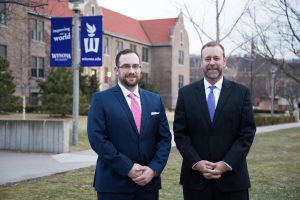Update: After this story was published, Carson Perry and Chris Hahn presented their personal branding workshop, “Building ME, Inc.,” at the Clute Institute-Conference for International Education in March. The foundation of the workshop is a collaborative paper written with Barbara Holmes titled “Building the Organizational Leader Brand: Change Agent, Scholar, Thought Leader.” The paper is now published in the Journal of International Research in Higher Education Vol. 2, No. 2 (2017.) The current issue containing this article can be located online at http://www.sciedupress.com/journal/index.php/irhe/issue/view/560.
For Chris Hahn and Carson Perry, presenting at the 2017 International Conference on Education in San Diego may have been a once in a lifetime opportunity, but lucky for the two Winona State University graduate students, the skills they’re learning through WSU’s graduate program in leadership education will last a lifetime.
Hahn and Perry’s proposal, “Building The Organizational Leader Brand: Change Agent, Scholar, Thought Leader,” outlines marketing, branding and engagement in higher education learning. The proposal started as a class project and turned into a chance to share their research with scholars from all over the world.
“It represents a tremendous opportunity to share knowledge with peers and other professionals that can contribute to the discussion, and collaboratively effect positive change,” said Hahn. “For me, these observations can offer new perspectives and facilitate the opportunity for personal growth.”
Barbara Holmes, Ph.D., Associate Professor of Educational Leadership, encourages graduate students in the program to become lifelong learners and to learn the value of research.
“Graduate students are taught not only how to become consumers of research, but also how to become producers of research,” said Holmes. “When graduate students participate in research conferences, seminars with researchers from different countries, they gain broader perspectives of new idea generation and their ability to influence new thinking in the discipline area.”
Holmes describes herself as a strong advocate for graduate student research.
“This kind of professional interaction provides a robust academic richness that is difficult to replicate in the standard campus-based classroom,” said Holmes. “WSU as a university benefits by having highly talented students as high capacity role models who are engaging with the larger academic community.”
For Perry, of Melrose, Wis., it’s also an opportunity to set a standard for their peers and other graduate students in the program.
“As graduate students, we should be contributing to academia through presenting work at conferences and working toward publication,” said Perry. “This process has helped me understand that it is a lot of work to accomplish what we have over the past several months, but it is not as daunting of a task as I previously thought.”
WSU offers more than 30 graduate programs in four colleges that lead to master’s, specialist, and Doctor of Nursing Practice degrees, as well as licensure and certificate programs. Programs include Nursing, Education, Leadership Education, Counselor Education, Special Education, Professional Science Master’s and English.
Jeanine Gangeness, Associate Vice President for Academic Affairs and Dean of Graduate Studies, emphasized WSU’s highly personalized approach to graduate study.
“Whether you are interested in furthering your education to qualify for a new job, change careers, or advance in your current position, our graduate programs are designed to help you position yourself for the future,” said Gangeness.
For more information on Graduate Studies at WSU, visit winona.edu/gradstudies/default.asp.

